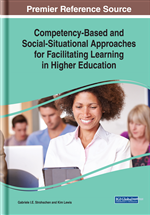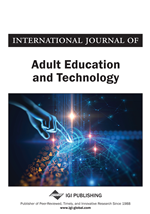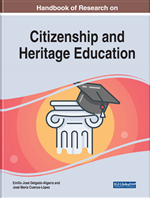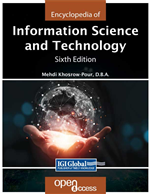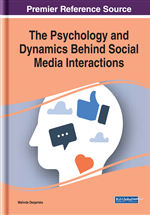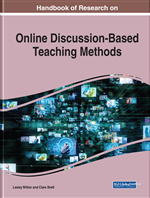Search
Results: 1413
The KRDS Benefit Analysis Toolkit
Neil Beagrie, Monica Duke, Manjula Patel, Liz Lyon, Catherine Hardman, Dipak Kalra, Brian Lavoie, Matthew Woollard
Dec 01, 2012
This paper provides an overview of the KRDS Benefit Analysis Toolkit. The Toolkit has been developed to assist curation activities by assessing the benefits associated with the long-term preservation of research data. It builds...
Potentials of Reflection for Better Practice
This chapter describes how adult learners in competency-based degree programs learn to reflect actively on their learning and performance. Vignettes of adult learners portray what they perceive as the benefits of reflective...
Published by: IGI Global Scientific Publishing
The KRDS Benefit Analysis Toolkit
Neil Beagrie, Monica Duke, Manjula Patel, Liz Lyon, Catherine Hardman, Dipak Kalra, Brian Lavoie, Matthew Woollard
Dec 01, 2012
This paper provides an overview of the KRDS Benefit Analysis Toolkit. The Toolkit has been developed to assist curation activities by assessing the benefits associated with the long-term preservation of research data. It builds...
Drives and Motives During Online Degree Completion
Catherine Cherrstrom
Jan 01, 2024
This study examined the motives and drives of adult students during online degree completion, including the commonalities among and differences between Hispanic and non-Hispanic adult students. Participants included 364 adult...
Published by: IGI Global Scientific Publishing
Citizenship and Social Studies Curricula in British Columbia, Canada
Catherine Broom
Jan 31, 2020
This chapter begins by reviewing the history of citizenship education in social studies curricula in British Columbia (BC), Canada, as a way of framing how the topic has been understood. It then discusses the latest curriculum...
Civic Engagement & Social Justice Education Curriculum Development and Instructional Design Government and Law
Published by: IGI Global Scientific Publishing
Twenty-First Century Immersion Technologies in Health Professions Pedagogy
Catherine Hayes
Jul 01, 2024
This encyclopedia entry provides insight into the justification of pedagogy in the context of extended reality (XR), which itself encompasses virtual reality (VR), augmented reality (AR), and mixed/hybrid reality (MR), and how...
Global Information Technology Computer Science and Information Technology Global Information Technology Physical Sciences and Engineering Business and Management
Published by: IGI Global Scientific Publishing
ENT audit and research in the era of trainee collaboratives.
Matthew E Smith, John Hardman, Matthew Ellis, Richard J Williams, The UK National ENT Trainee Research Network INTEGRATE
Sep 20, 2018
Large surgical audits and research projects are complex and costly to deliver, but increasingly surgical trainees are delivering these projects within formal collaboratives and research networks. Surgical trainee collaboratives...
Digital Social Media in Adolescents' Negotiating Real Virtual Romantic Relationships
Previous grounded theoretical analyses of rural adolescents' romantic relationship discussions identified media as critical conditions in negotiating gender expectations in intimate relations. More recent emergent fit analyses...
Social Networking Social Sciences and Humanities Human Aspects of Technology Media and Communications
Published by: IGI Global Scientific Publishing
The Grizzly, September 20, 2012
Jessica Orbon, Sara Sherr, Michael Klazas, Larissa Coyne, Keith Miles, Matthew Johnston, Rayleen Rivera-Harbach, Marcus Foster, Jarod Groome, Christine Dobisch, Olivia Z. Schultz, Michael D'Amico, Allen Weaver, Austin Fox
Jan 01, 0001
USGA Elections WeCAN's Wismer Plans Yard Sale Saturday Textbook Prices a Problem Late Night Lower Back SUN and UC Dems Hold Political Talk Accessible Art in the Berman New Chalk Rules Opinion: Don't Rely on Social Media...
Ursinus College Collegeville Pennsylvania newspaper Wismer dining hall student government textbooks SUN Democrats Berman Art Museum Campus Activities Office Football Soccer field hockey Volleyball cross country Catherine Bitterly cultural history Higher Education Liberal Studies Social History United States History
Published by: Ursinus College
Learning‐Based Damage Recovery for Healable Soft Electronic Skins
Seppe Terryn, David Hardman, Thomas George Thuruthel, Ellen Roels, Fatemeh Sahraeeazartamar, Fumiya Iida
Nov 01, 2022
Natural agents display various adaptation strategies to damages, including damage assessment, localization, healing, and recalibration. This work investigates strategies by which a soft electronic skin can similarly preserve its...
3D Printable Soft Sensory Fiber Networks for Robust and Complex Tactile Sensing.
David Hardman, Thomas George Thuruthel, Antonia Georgopoulou, Frank Clemens, Fumiya Iida
Oct 24, 2022
The human tactile system is composed of multi-functional mechanoreceptors distributed in an optimized manner. Having the ability to design and optimize multi-modal soft sensory systems can further enhance the capabilities of...
Self-healing ionic gelatin/glycerol hydrogels for strain sensing applications
Abstract Soft sensing technologies have the potential to revolutionize wearable devices, haptic interfaces and robotic systems. However, there are numerous challenges in the deployment of these...
Ed Tech in Adult Online Learning
Educational technology facilitates convenient access to online programs for adult students but also presents challenges. Using a conceptual framework of Knowles' andragogy process of program development and learner interaction...
Published by: IGI Global Scientific Publishing
The Grizzly, April 11, 2002
Anne Antanavage, '04, Cornota Harkins, Fallon Szarko, Sarah Ewald, Nicole Gaughan, Quinn Dinsmore, Katie Petersen, Syreeta Dixon, Kelly Gray, Katie Lambert, Joyce Koubouralis, Adrienne Lopata, Travis Roop, Josh Rucci, Harry Michel, Julie Micklos, Frank Romascavage, III
Jan 01, 0001
Students Impressed with the Tour of North Hall The Dean's Office Announces the Retirement of Martha Takats, Ray Schultz and Keith Hardman For the Children: How Far is Too Far in Internet Censoring? Spring is in the Air and so...
Ursinus College Collegeville Pennsylvania newspaper lacrosse softball tennis Rugby sororities fraternities Pat McGee Band North Hall College Choir Sonia Sanchez Phillipa A. Turner Martha Takats Ray Schultz Keith Hardman cultural history Higher Education Liberal Studies Social History United States History
Published by: Ursinus College
The Ursinus Weekly, December 17, 1970
Alan Gold, Bruce Hess, Marc Hauser, Carol Barenblitt, Candy Silver, Don McAviney, Cris Crane
Jan 01, 0001
President Pettit cautions equating size & success in U.S. colleges today Bomberger renovation plan joins new gym construction Ken Hedrick vies for All-American stat title Burglary plagues U.C. during Thanksgiving Editorial...
Ursinus College Collegeville Pennsylvania newspaper Phi Beta Kappa Bomberger Memorial Hall gymnasium Ken Hedrick Football burglary Theft curfew system rules and customs Lewis P. Orchard Keith J. Hardman marriage women's rules Harry Adrian Basketball field hockey cultural history Higher Education Liberal Studies Social History United States History
Published by: Ursinus College
The Grizzly, September 4, 1987
Jean M. Kiss, Lora L. Hart, E.T. Shrdlu, Karen Singhofen, Richard P. Richter, Chris Goldberg, Jill Theurer, Anne Woodworth, Andrea Power, Craig DiLouie, Steve Gall, Scott McCartney
Jan 01, 0001
Convocation Greets Academic Year Eisenhower Speech Kicks off New Year Land of the Rising Sun "Student Life" Shapes Up Letter: Just Call Me Papa Juan Just When You Thought It was Safe Garrick Joins Resident Director...
Ursinus College Collegeville Pennsylvania newspaper academic convocation Tohoku Gakuin University David Eisenhower Office of Student Life Football cross country field hockey Cathy Garrick Debbie Heil Katherine Hager Michelle Quinlan Evening school Keith Hardman Jeffrey Neslen Elliot Tannenbaum Soccer video rental stores Grateful Dead cultural history Higher Education Liberal Studies Social History United States History
Published by: Ursinus College
Self-Directed/Community-Supported Learning
MOOC designers seeking to address evolving ambitions of MOOCs to support workforce development confront a fundamental design dilemma: on the one hand, the self-paced nature of online learning is efficient for busy learners...
Instructional Design Education Educational Technologies Media and Communications Computer Science and Information Technology
Published by: IGI Global Scientific Publishing
The ‘ownership’ of science
Dr Catherine Rhodes is a research fellow at the Institute for Science, Ethics and Innovation specialising in the international regulations relevant to control of biotechnology. Professor John Harris is director of the Institute...
|
|< |
< |
1 |

